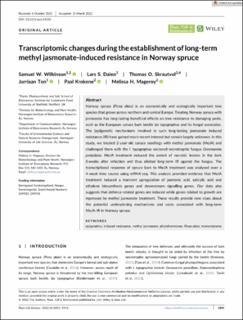| dc.contributor.author | Wilkinson, Samuel | |
| dc.contributor.author | Dalen, Lars Sandved | |
| dc.contributor.author | Skrautvol, Thomas Olufsen | |
| dc.contributor.author | Ton, Jurriaan | |
| dc.contributor.author | Krokene, Paal | |
| dc.contributor.author | Mageroy, Melissa | |
| dc.date.accessioned | 2022-10-12T14:36:59Z | |
| dc.date.available | 2022-10-12T14:36:59Z | |
| dc.date.created | 2022-04-22T21:39:30Z | |
| dc.date.issued | 2022-03-29 | |
| dc.identifier.citation | Plant, Cell and Environment. 2022, 45 (6), 1891-1913. | en_US |
| dc.identifier.issn | 0140-7791 | |
| dc.identifier.uri | https://hdl.handle.net/11250/3025678 | |
| dc.description.abstract | Norway spruce (Picea abies) is an economically and ecologically important tree species that grows across northern and central Europe. Treating Norway spruce with jasmonate has long-lasting beneficial effects on tree resistance to damaging pests, such as the European spruce bark beetle Ips typographus and its fungal associates. The (epi)genetic mechanisms involved in such long-lasting jasmonate induced resistance (IR) have gained much recent interest but remain largely unknown. In this study, we treated 2-year-old spruce seedlings with methyl jasmonate (MeJA) and challenged them with the I. typographus vectored necrotrophic fungus Grosmannia penicillata. MeJA treatment reduced the extent of necrotic lesions in the bark 8 weeks after infection and thus elicited long-term IR against the fungus. The transcriptional response of spruce bark to MeJA treatment was analysed over a 4-week time course using mRNA-seq. This analysis provided evidence that MeJA treatment induced a transient upregulation of jasmonic acid, salicylic acid and ethylene biosynthesis genes and downstream signalling genes. Our data also suggests that defence-related genes are induced while genes related to growth are repressed by methyl jasmonate treatment. These results provide new clues about the potential underpinning mechanisms and costs associated with long-term MeJA-IR in Norway spruce. | en_US |
| dc.language.iso | eng | en_US |
| dc.publisher | John Wiley & Sons Ltd. | en_US |
| dc.rights | Attribution-NonCommercial-NoDerivatives 4.0 Internasjonal | * |
| dc.rights.uri | http://creativecommons.org/licenses/by-nc-nd/4.0/deed.no | * |
| dc.title | Transcriptomic changes during the establishment of long-term methyl jasmonate-induced resistance in Norway spruce | en_US |
| dc.title.alternative | Transcriptomic changes during the establishment of long-term methyl jasmonate-induced resistance in Norway spruce | en_US |
| dc.type | Peer reviewed | en_US |
| dc.type | Journal article | en_US |
| dc.description.version | publishedVersion | en_US |
| dc.rights.holder | © 2022 The Authors | en_US |
| dc.source.pagenumber | 1891-1913 | en_US |
| dc.source.volume | 45 | en_US |
| dc.source.journal | Plant, Cell and Environment | en_US |
| dc.source.issue | 6 | en_US |
| dc.identifier.doi | 10.1111/pce.14320 | |
| dc.identifier.cristin | 2018541 | |
| dc.relation.project | Norges forskningsråd: 249958 | en_US |
| dc.relation.project | Sigma2: nn9433K | en_US |
| dc.relation.project | Norges forskningsråd: 249920 | en_US |
| cristin.ispublished | true | |
| cristin.fulltext | original | |
| cristin.qualitycode | 2 | |

